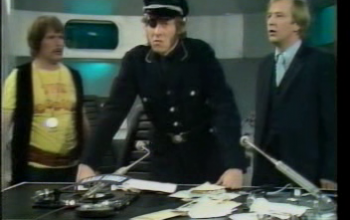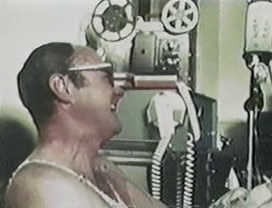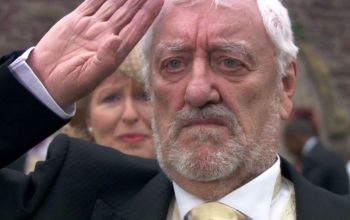The Frankenstein Chronicles Season 1 (2015)
I usually start these essays by summarising the plot, but as Frankenstein Chronicles is a meandering six episode series, it’s probably not a great idea to go into it in too much depth. Even so, there may be spoilers. Basically, Sean Bean is Inspector Merritt of the Thames Water Police in 1827. While investigating a crime, he discovers a body – or rather parts of several bodies that have been stitched together into a single body. He is ordered to investigate by Sir Robert Peel (Tom Ward) himself, who feels that the murder is an attempt to derail the Anatomy Act of 1830. His investigation leads him to learn about the story of Frankenstein. But is the patchwork body just a mad killer’s whim or an actual attempt to raise the dead?
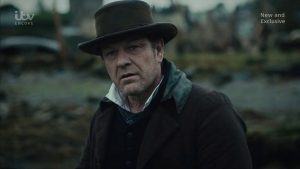
It’s a very atmospheric piece. Sean Bean is excellent as the stolid Marlott, a dogged, guilt-ridden and slowly dying man. The rest of the cast is almost as impressive and the filming is absolutely gorgeous. After all, British TV seldom fails to do right by nineteenth century period pieces. On the downside, the pace is not just slow, it’s glacial. More frustratingly, the show brings up a laundry list of interesting ideas, it doesn’t do anything satisfying with them.
For example, we revisit ideas about the relationship between the body and soul that were challenged in the early nineteenth century, only to deal with it in a shallow and predictable way. It wonders at the relationship between inner vision and external reality, when the last, secret work of William Blake (Steven Berkoff) turns out to be a clue to Merritt’s investigation. But the show drops this idea, with a weak payoff on this subplot.
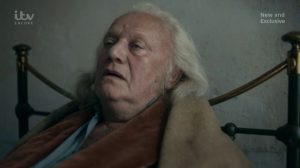
‘How about Steven Berkoff?’
‘Niiiice. And how much screen time should he get?’
‘Say… a minute?’
It brings up the question of the difference between fiction and reality with Mary Shelley (Anna Maxwell Martin)herself being a character in a Frankenstein story, but then takes an extraordinarily prosaic approach to Mary’s subplot before dropping it. Themes of class, justice, gender and power are all raised, but none are dealt with in a satisfying way. It’s almost as if the makers of the Frankenstein Chronicles wanted to reviewers to say their work ‘deals with themes of class, justice, gender, power, death, the soul and the power of fiction,’ but didn’t quite know how to earn a judgement like that.
More than anything, I suspect that the writers of this were inspired by the first season of True Detective, except with English Gothic replacing Southern Gothic. The difference is that True Detective seamlessly melded its themes into plot, character and symbol, whereas Frankenstein Chronicles just bolts them on and hopes.
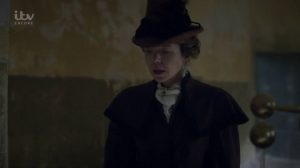
True Detective can be read as a straight-up detective story or a supernatural horror story, and the horror elements are all the more unsettling for being ambiguous. This is achieved in part, by making the character of ‘Rust’ Cole (Matthew McConnehey an unreliable narrator by virtue of mental illness and addiction. Frankenstein Chronicles attempts the same thing through Marlott’s syphilis-induced hallucinations. But then it undoes this ambiguity by making it quite easy to tell when he is seeing things or not. The inclusion of William Blake as a character offers the possibility of blurring the line between vision and reality, but Blake barely gets a word in before dying.

It’s probably just as well. Merritt’s prosaic and repetitive visions aren’t exactly Blakean. Mary Shelley’s literature isn’t really handled well either. It’s strongly implied that her story is based on an actual even in which an attempted reanimation by electricity went wrong. Basically, the show is saying that ‘Frankenstein’ was a mistake and Mary Shelley was really trying to write Flatliners. A third literary figure rears his head in the form of a young, and almost unrecognisably shallow and cowardly Charles Dickens (Ryan Sampson). Here we’re on much firmer ground – there are a number of characters and situations that are recognisably Dickensian. But Merritt pointedly and repeatedly refuses to tell Dickens any of his stories, so it’s not at all clear how the reality connects with the fiction.
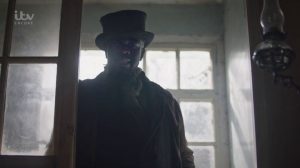
Other themes and ideas fizzle as well. A part of the conceit is that the action occurs within the context of debate over the Anatomy Act of 1830 (which among other things stopped the trade in grave robbery by creating a source of legally available corpses for medical students to dissect). This debate is presented as a fight between traditional Christianity and the forces of modernity and materialism. The argument is raised, but the story doesn’t care to take a side. The Christian side is made to implode in the laziest way possible – its champion (Eliot Cowan) is revealed as a hypocrite and blackmailed into backing down.
Perhaps that looks like taking a side, but the materialist side is shown to be worse. It is represented by Sir Robert Peel (Tom Ward) who is shown to be a cynical manipulator and two surgeons (played Samuel West and Mark Bazeley) who are shown to be a mad scientist and a rapist, respectively. Oh, and the other major Christian guy (Daniel Stoppard) is actually also a mad scientist. So, yeah, you know both sides, man. Amirite?
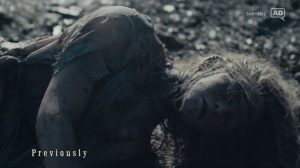
Okay, I’ve complained enough, why not say something nice. I warned about spoilers earlier, but serious spoilers here. Let’s talk about the ending. Sean Bean – a fine actor, best known for his many onscreen deaths. We have a) a horror story staring b) Sean Bean in which c) Bean is portraying a man suffering from a fatal disease. His death is pretty much set in stone from the opening shot. In the end Bean dies, because of cause it does, but then he comes back as a Frankensteinian revenant.
It. Is. Brilliant.
Yes, Sean Bean dies because he’s Sean Bean, but still he gets to walk away at the end. Alone, penniless and destitute, but up and kicking. It’s aliiiiive — and in this case ‘it’ is Sean Bean. The mind boggles.
This isn’t enough to salvage the series. It isn’t enough to help figure out just what point the makers were shooting for. It doesn’t make very long, slow scenes go any faster. But yeah, it does mean that I get to walk away from the show, not regretting that I watched it.
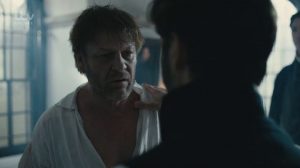
I want to like Frankenstein Chronicles. I really do. On paper, it looks great. If someone set out to write a TV series just to appeal to me, they’d write something very much like this. It’s just that it doesn’t quite work in practice. The ideas never quite coalesce into something worthwhile. The strands of detective story, period piece and horror story never quite gel. Characters are raised to prominence, only to be forgotten. Ideas are brought up and abandoned. Frankenstein Chronicles determined to say something but can’t quite make its mind up on what that is. And the most frustrating thing is, I get the feeling that it was almost there – as if one more draft of the script could have produced something genuinely memorable. But what can I say? Sometimes when you give your creation a jolt and it gets up and walks, and sometimes it just doesn’t. Maybe the next try will be better.

